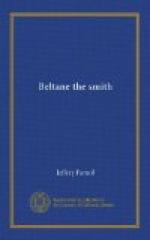“Aye,” cried Giles, “and lovely ladies brought to shame! So, Garthlaxton—smoke!”
“And,” quoth frowning Walkyn, “I would that Pertolepe’s rank carcass smoked with thee!”
“Content you, my gentle Walkyn,” nodded the archer, “hell-fire shall have him yet, and groweth ever hotter against the day—content you. So away with melancholy, be blithe and merry as I am and the sweet-voiced throstles yonder—the wanton rogues! Ha! by Saint Giles! See where our youthful, god-like brother rideth, his brow as gloomy as his hair is bright—”
“Ah,” muttered Roger, “he grieveth yet for Beda the Jester—and he but a Fool!”
“Yet a man-like fool, methinks!” quoth the archer. “But for our tall brother now, he is changed these latter days: he groweth harsh, methinks, and something ungentle at times.” And Giles thoughtfully touched his arm with tentative fingers.
“Why, the torment is apt to change a man,” said Walkyn, grim-smiling. “I have tried it and I know.”
Now hereupon Giles fell to whistling, Walkyn to silence and Roger to scowling; oft looking back, jealous-eyed, to where Beltane rode a black war-horse, his mail-coif thrown back, his chin upon his breast, his eyes gloomy and wistful; and as often as he looked, Roger sighed amain. Whereat at last the archer cried:
“Good lack, Roger, and wherefore puff ye so? Why glower ye, man, and snort?”
“Snort thyself!” growled Roger.
“Nay, I had rather talk.”
“I had rather be silent.”
“Excellent, Roger; so will I talk for thee and me. First will I show three excellent reasons for happiness—videlicit: the birds sing, I talk, and Garthlaxton burns.—”
“I would thou did’st burn with it,” growled Roger. “But here is a deed shall live when thou and I are dust, archer!”
“Verily, good Roger, for here and now will I make a song on’t for souls unborn to sing—a good song with a lilt to trip it lightly on the tongue, as thus:
“How Beltane burned Garthlaxton
low
With lusty Giles, whose good yew
bow
Sped many a caitiff rogue, I trow,
Dixit!”
“How!” exclaimed Roger, “here be two whole lines to thy knavish self and but one to our master?”
“Aye,” grumbled Walkyn, “and what of Roger?—what of me?—we were there also, methinks?”
“Nay, show patience,” said Giles, “we will amend that in the next triplet, thus:
“There Roger fought, and Walkyn
too,
And Giles that bare the bow of yew;
O swift and strong his arrows flew,
Dixit!”
“How think ye of that, now?”
“I think, here is too much Giles,” said Roger.
“Forsooth, and say ye so indeed? Let us then to another verse:
“Walkyn a mighty axe did sway,
Black Roger’s sword some few
did slay,
Yet Giles slew many more than they,
Dixit!”




